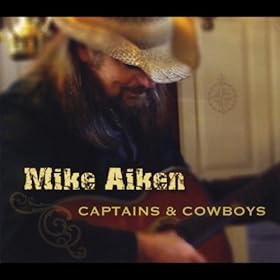|
Mike Aiken, Captains & Cowboys (Northwind, 2013)
From time to time, individual acts have sought to fuse country arrangements with folk lyricism. While Johnny Cash serves as the most notable example, others as interesting in their own right -- Steve Young, James Talley, Randy Thompson and more -- have done the same. Some have been country singers influenced by folk, some the other way around. The Virginia-based Mike Aiken's Captains & Cowboys, his sixth studio album but the first I've heard, is a country singer with occasional folk references, which means his lyrics can be more free-ranging than country's, which are tightly constricted to tried-and-true motifs. The album has a nice sound: modern in the way of present-day Nashville but without the requisite bombastic stadium rock. Aiken and his co-producers Dan Baird and Ben Strano leave some space for musicians and listeners to catch their breath, affording the record a more intimate feeling than one experiences on exposure to the dreary product that rolls off Music City's assembly line these days. It boasts some fine cuts, specifically Aiken's "Coal Train" and "Get Down River" as well as a powerful reading of Country Joe McDonald's "Save the Whales," an indictment of the whaling industry enhanced by the refrain from the 19th-century shanty "Drunken Sailor." That's another thing that's likable about this album: Aiken's social conscience, something you'd expect in a folk singer but not in a country equivalent. Unfortunately, Aiken's songwriting proves to be a jarringly uncertain thing. Too much of it amounts to cliche recycling. "Summertime Song," "Bring Out the Bourbon," "Dance with the Wind" and "Take the Boy Fishin'" are devoted to subjects and stories handled more engagingly (if way too often) elsewhere. In these moments one can't help thinking of a countryish Bill Staines -- not a compliment -- or of an otherwise creative, thoughtful performer composing, out of purely monetary concerns, what he hopes will catch the attention of studio-bound mega-selling hacks. I suppose one can't blame him for that, but the result is a diluted art. Aiken is good enough that one can only be disappointed that this isn't a better, more consistent record. 
|
 Rambles.NET music review by Jerome Clark 11 May 2013 Agree? Disagree? Send us your opinions!  



 |

